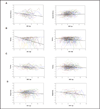Self-Reported Memory Complaints: A Comparison of Demented and Unimpaired Outcomes
- PMID: 27019842
- PMCID: PMC4807968
- DOI: 10.14283/jpad.2015.74
Self-Reported Memory Complaints: A Comparison of Demented and Unimpaired Outcomes
Abstract
Background: Subjective memory complaints are common in aged persons, indicating an increased, but incompletely understood, risk for dementia.
Objective: To compare cognitive trajectories and autopsy results of individuals with subjective complaints after stratifying by whether a subsequent clinical dementia occurred.
Design: Observational study.
Setting: University of Kentucky cohort with yearly longitudinal assessments and eventual autopsies.
Participants: Among 516 patients who were cognitively intact and depression-free at enrollment, 296 declared a memory complaint during follow-up. Among those who came to autopsy, 118 died but never developed dementia, while 36 died following dementia diagnosis.
Measurements: Cognitive domain trajectories were compared using linear mixed models adjusted for age, gender, years of education and APOE status. Neuropathological findings were compared cross-sectionally after adjustment for age at death.
Results: While the groups had comparable cognitive test scores at enrollment and the time of the first declaration of a complaint, the group with subsequent dementia development had steeper slopes of decline in episodic memory and naming but not fluency or sequencing. Autopsies showed the dementia group had more severe Alzheimer pathology and a higher proportion of subjects with hippocampal sclerosis of aging and arteriolosclerosis, whereas the non-demented group had a higher proportion expressing primary age related tauopathy (PART).
Conclusions: While memory complaints are common among the elderly, not all individuals progress to dementia. This study indicates that biomarkers are needed to predict whether a complaint will lead to dementia if this is used as enrollment criteria in future clinical trials.
Keywords: Subjective memory complaints; cognitive trajectories; impairment status; neuropathology.
Conflict of interest statement
Figures
References
-
- Geerlings MI, Jonker C, Bouter LM, Ader HJ, Schmand B. Association between memory complaints and incident Alzheimer’s disease in elderly people with normal baseline cognition. Am. J. Psychiatry. 1999;156(4):531–537. - PubMed
-
- Wang L, van Belle G, Crane PK, et al. Subjective memory deterioration and future dementia in people aged 65 and older. J. Am. Geriatr.. Soc. 2004;52(12):2045–2051. - PubMed
-
- Jessen F, Wiese B, Bachmann C, et al. Prediction of dementia by subjective memory impairment: effects of severity and temporal association with cognitive impairment. Arch. Gen. Psychiatry. 2010;67(4):414–422. - PubMed
Grants and funding
LinkOut - more resources
Full Text Sources
Miscellaneous

